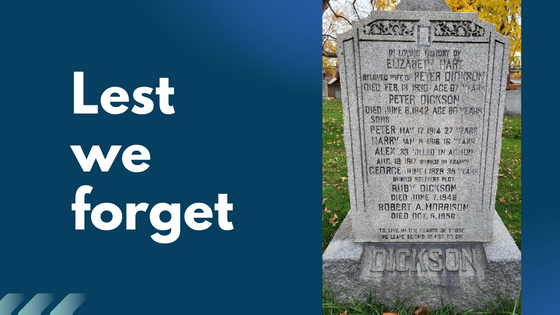11-11-18: REMEMBRANCE.
I always find Remembrance Day a time for meditation and gratitude. Here in Canada, the day marks the end of World War 1. As the story goes at the 11th hour on the 11th day of the 11th month in 1918, armistice was signed and WW1, aka The Great War, ended.
As a historian by education, I mark this date and time as having great significance in the overall scheme of history. But history as a subject of study and scholarly analysis tends to be cold and calculating - so many died, so much destruction, so devastating as to be called The Great War. For most of us, it is "that something" that took place "back then". It says little or nothing to each of us as we personally go about our daily lives...except on that one day to remember that my life and the freedoms I enjoy are built on the event that took place "back then".
History taught in school or presented in books distances us from everyday reality. They focus on generalities – wars, leaders, victories, defeats. The shear magnitude of numbers killed leads us to think that “this event, that war, those leaders, those dead” have nothing to do with each of us personally. At most, we remember with gratitude those who made the ultimate sacrifices so that we might enjoy the good life today.
But is remembrance enough? At best, it is a fleeting recall tangentially tinged with gratitude seemingly limited to older codgers whose lives might have been lived closer to "those times". Far be it from me to consider myself someone from those times...although both my parents were born in 1920. They were very much part of "those times" marked by The Great War and WW2, the Depression, and multiple pandemics such as the Spanish flu in the early 1900s, typhus and scarlet fever in the 1930s-40s, and polio in the 1950s.
The question still haunts: What does the past have to do with you or me here and now? What is history, after all? The day a child is born, history begins – for that child, for the family, for society in general. That birth may not be as momentous as the Battle of the Marne was in the general scheme of history as recorded and taught, but it is an historic event of great significance. History is a personal journey, and not just something we read or learn about. It is about lives lived, and deaths that happen. Putting individual lives inside the context of a significant event, like the Great War, makes history personal, and not just something to recall. Remembrance is about people; remembrance is about you and me, here and now, and not just about “back then”. Remembrance Day is when all of this history comes home to roost, as it were, at a personal level for me.
As prayers are prayed, songs are played, wreathes are laid, I meander in the local cemetery that is a simple streetcar ride from my house. This Cemetery is notable because a large section is devoted to Canadian Military who died especially during World War 2. It memorializes the Earlscourt Residents who made the ultimate sacrifice. But I am drawn to Section 1, the oldest part of the Cemetery. Here we find stalwarts born in the mid-to-late 1800s, who died in Toronto, then the Dominion of Canada, in their 80s. There I stop by the stone memorial of the Dickson Family.

I do not know anyone from the Dickson Family; I don't even know if any family member still lives; I do not stand there to pray; I stand there to remember. On that stone is memorialized the truth of The Great War. It brings history writ big in books home to the everyday of personal lives. Remembrance is about people. Remembrance is about you and me. Elizabeth, Wife and Mother, died at the age of 87 in 1930; Peter, Husband and Father, died at the age of 80 in 1942. Both outlived their four sons –
- Peter died at age 27 in May 1914 – as war began;
- Alex died at age 33 in August 1917 – buried somewhere in France;
- George died at age 35 in June 1929, 11 years after Armistice, and buried in a soldier’s plot;
- Harry died at age 16 in January 1916, possibly from the global pandemic aka the “Spanish flu”, that other great tragedy in the early 20th
This brings history to life on the level of individuals and their personal histories. Vimy Ridge, Paschendale, the Marne, Global Pandemic – and so much more between 1914 and 1918 – are all writ large in stone dedicated to this one family in this modest cemetery in a remote part of mid-town Toronto. And this is what we remember: those who were born and once lived; those who were adults and celebrated birthdays; those who had parents who rejoiced in their births and outlived them in their deaths.
As we remember on November 11, 2022, I think of the Dickson Family.
Lest We Forget.
Victor Deyglio
The Logistics Institute
